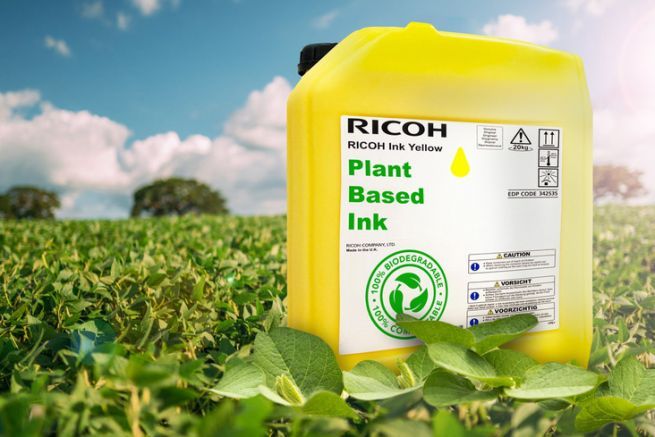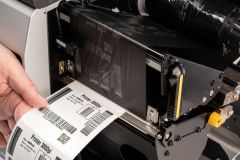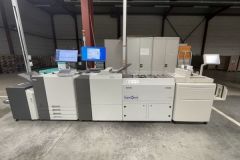Unlike inkjet inks that are aqueous or UV, Ricoh's new ink is based on vegetable oil, specifically soybean oil. The first of its kind for graphic and packaging printing, according to the manufacturer, this ink named Ricoh Plant Based Ink should help printer brands and manufacturers to reduce their environmental impact.
To create this ink, which it describes as innovative, Ricoh started with the mineral oil-based ink pigmented for the decorative printing market and used in its collaboration with the German equipment manufacturer Olbrich, which specializes in the wallpaper industry.
Ricoh Plant Based Ink, a non-drying ink for open media
Available in CMYK, this ink is intended for printing on open substrates such as brown and white corrugated boards and solid board. It has multiple advantages over water-based and mineral-based solutions.
The oil penetrates porous substrates leaving the pigment near the surface. This reduces energy consumption, eliminating the need for a drying system to set and dry the ink.
No odor or volatile organic compounds (VOCs) are released from the application of this ink. It does not contain water, so no biocide is needed to keep the ink usable. It is also biodegradable and supports deinking.
In addition, the printheads have a much longer open time, making the nozzles easier to clean and less likely to clog, improving reliability, performance and inkjet head life.
Up to 50% less ink consumption
The Ricoh Plant Based Ink would also induce a lower ink consumption compared to UV inks and aqueous inks. "The tests we've done so far suggest an ink reduction on the order of about 50 percent to achieve the same optical density as a water-based ink." this is the first time that Ricoh has been involved in the development of a new printing system," said Graham Kennedy, director of industrial printing, graphic communications, Ricoh Europe, at the Future Print Pack Summit 2021 in January.
65,000 euros in annual electricity savings
With a conventional single-pass system with a web width of 500 millimeters and a printing speed of 50 linear meters per minute, this vegetable-based ink would result in electrical energy savings of ?65,000 in one year and 150 tons less CO2, according to Graham Kennedy.
"This ink is intended for OEM system manufacturers, who primarily, but not exclusively, adopt Ricoh MH5421 printheads, and focus on the corrugated markets." says Ricoh.
"Printer brands and manufacturers are increasingly focused on reducing their environmental impact and implementing sustainable practices wherever possible. With our new plant-based ink, they can seamlessly implement positive changes that make a big difference without affecting their high-quality print results." says Graham Kennedy.












